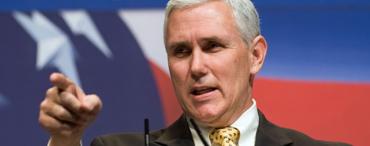
After his strong debate performance against Tim Kaine, Mike Pence is now the subject of 2020 presidential buzz.
That’s way too premature. While he might be an underdog, Donald Trump’s not out of the game yet. Of course, some of the early 2020 buzz is based on Pence’s debate performance but part of that comes from the Indiana governor shrugging off Kaine’s jabs at Trump instead of rushing in to defend his running mate. At times, Pence came off as more focused on making his points than going to bat for Trump. The distance between the two running mates probably isn’t as wide as the “Never Trump” Republicans like to insist it is but the perspective might be influenced by Pence’s role on the campaign trail. Pence simply hasn’t been as passionate a defender of Trump as Rudy Giuliani, Chris Christie and Newt Gingrich have been.
Certainly, the Indiana governor made an impression on the GOP’s leaders. Plenty of Republican leaders told Politico this week that Pence would do far better against Hillary Clinton than his running mate will.
Pence might be putting down his first chips for 2020 but he doesn’t exactly have the best of launching pads for the future. Sure, Paul Ryan, Marco Rubio and Ted Cruz and other Republicans with 2020 on their brain might be hindered with their inconsistent support of Trump. On paper, Pence would be a candidate who could tie together much of the GOP coalition. He appeals to evangelicals, Trump supporters, defense hawks and, based on his stint in the congressional leadership, should keep the establishment in the fold. But the Pence 2020 bandwagon will face problems if Trump loses next month, namely the challenges associated by being on a losing ticket.
Defeated vice presidential candidates simply haven’t been able to use being on their party’s ticket to propel themselves to the White House. Granted, FDR was able to win the presidency after coming up short as James M. Cox’s running mate against the Warren Harding-Calvin Coolidge ticket back in 1920. But, between that election and winning the presidency in 1932, Roosevelt battled polio, took to the national stage for Al Smith in 1924 and 1928 and won two terms as governor of New York, then the largest state in the nation.
No other losing vice presidential candidate had that kind of success. Four years after their vice presidential bids, Henry Cabot Lodge, Ed Muskie, Bob Dole, Joe Lieberman and John Edwards didn’t come close to winning the presidency. None of them even won their party’s nominations. Some of them--Muskie and Lieberman in particular--started off at the top of the polls but faded while others simply got eclipsed by bigger names. Dole simply couldn’t compete with Ronald Reagan while Edwards was no match for Barack Obama.
Nor is Pence the only Republican with early 2020 dreams. A crowd of Republicans are already starting to line up for 2020. A month until the presidential election, Republicans are busy in Iowa and New Hampshire, both of which should be swing states in November. The Wall Street Journal reported this week that Tom Cotton and Scott Walker are already active in Iowa helping Republicans while Walker, Nikki Haley and John Kasich are ready to help GOP gubernatorial candidate Chris Sununu in New Hampshire.
It’s too early for all of this. No matter how impressive his performance was against Kaine, Pence’s presidential ambitions rely in large part of what happens over the next month. Let the 2020 election wait until after the 2016 one.



